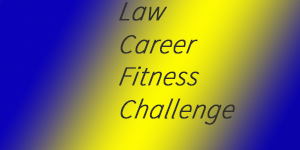Law Career Fitness Challenge #4- Avoid Procrastination and Get Started
 Begin, the rest is easy!
Begin, the rest is easy!
That might sound like fortune cookie advice, but it’s actually a key to building a strong and successful practice.
Pick any endeavor – writing a law review article, studying for a torts final, running a marathon – and you’ll find the hardest part is taking the first step. After that, everything falls more or less into place.
In fact, getting started is so crucial that three of Stephen Covey’s “Seven Habits of Highly Effective People” are variations on the same theme:
- Be proactive
- Begin with the end in mind
- Put first things first
Putting Procrastination in its Place
The big enemy of getting started is procrastination. And make no mistake, this is a formidable foe. It strikes without warning, at all hours of the day or night. It targets people of all ages and occupations. It whispers insidiously in our ear to put off until tomorrow – or better yet, next week or next lifetime – what could and should be done today. Right. This. Minute.
The worst part of procrastination is that we know better. We know we should be studying instead of watching YouTube cat videos. We know we should be updating our resume instead of taking a nap.
We feel guilty about procrastinating, which leads to self-loathing and more procrastination, and on and on the cycle spins.
The lay out of this trap is to understand that procrastination is not a sign of weakness or failure. It’s a sign of being human.
The psychologist-authors of “Procrastination: Why You Do It, What To Do About It” say the root cause of procrastination is fear. They identify three categories of procrastinators:
- One type puts off completing tasks for fear of being evaluated and criticized.
- A second type is habitually slow in completing assignments for fear of losing control once the job is done.
- A third type tends to put social activities ahead of desk time out of a fear of solitude.
Do you see yourself in any of these descriptions?
Five Training Tips
- Read Rule of Professional Conduct 1.3. “[3] Perhaps no professional shortcoming is more widely resented than procrastination. A client’s interests often can be adversely affected by the passage of time or the change of conditions. In extreme instances, as when a lawyer overlooks a statute of limitations, the client’s legal position may be destroyed. Even when the client’s interests are not affected in substance, however, unreasonable delay can cause a client needless anxiety and undermine confidence in the lawyer’s trustworthiness.”
- Follow the three-minute rule. If during the course of the day you encounter a task that can be accomplished in three minutes or less, stop and do it right then and there. That way, your daily to-do list is not always growing longer.
- Clear the decks. Sweep away the dust and clutter that is preventing you from moving forward. “[G]ather up every single thing that requires action on your part: unopened mail, emails, voicemails, countertop clutter, reading materials, scary catch-all cabinets you can barely open,” according to Getting Things Done. “For larger items that don’t fit into a desktop inbox (a broken fridge, a leaky faucet) make an individual note and add it to the pile…. [D]evote a separate sheet of paper to each idea or project. A discrete, physical object helps make an idea more concrete, and it lets you track each item individually, increasing its chances of getting done.”
- Visualize doing something you love. Ride the wave. Move those positive thoughts and feelings into the procrastinating moment. It might sound goofy, but it works. When you’ve finished the job, give yourself a reward.
- Overcome inertia. A body at rest tends to stay at rest, and a body in motion tends to stay in motion. Get up off the couch. Do something. Anything. Then keep going.
“What you can do or dream you can do, begin it,” says Goethe. “Boldness has genius, power and magic in it.”
What you can do or dream you can do, begin it
If you missed last week's challenge, check it out here.
Sources:
- The Seven Habits of Highly Effective People http://www.amazon.com/The-Habits-Highly-Effective-People/dp/0743269519
- Procrastination: Why You Do It, What To Do About It Now http://www.amazon.com/Procrastination-Why-You-What-About/dp/0738211702
- N.C. State Bar http://www.ncbar.com/rules/rules.asp
- Power Practice Attorneys http://www.powerpracticeattorneys.com/change-anything-you-want-in-10-minutes/?goback=%2Egde_2691620_member_203188607
- Getting Things Done https://gtdconnect.com/store/product.php?productid=17035
- CBS News http://www.cbsnews.com/news/how-to-get-started-with-getting-things-done/




